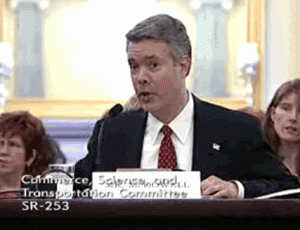Everybody and their mother who watches Federal Communications Commission politics wrote up pretty much everything proposed FCC Chair Julius Genachowski said at his Senate Commerce Committee nomination hearing on Tuesday. But a lot less got written about the comments of the other nominee: Republican Robert M. McDowell, he up for a reappointment. And even less words appeared about some of the noteworthy things McDowell didn’t say—particularly about the Fairness Doctrine.
“First of all,” began Senator Kay Bailey Hutchison of Texas as soon as it was time for questioning McDowell, “on the Fairness Doctrine, that is something that is very important to many people. . . ”
Ban all unbanning
Now, before we continue with Hutchison’s question, let’s step back and make an observation. The fact that the Fairness Doctrine is “very important to many people” is a curiosity to many other people, including me. This FCC rule, which required radio and television stations to offer “reasonable access” to opposing points of view, has been deservedly extinct for 21 years. The President of the United States says he opposes its return. Michael Copps, current Chair of the FCC opposes its return. Genachowski said he won’t bring it back. A few Democrats say they favor it, but there is no bill in the House or Senate calling for its restoration, although an amendment has passed the Senate which would forever ban its being unbanned in the unlikely event somebody actually wanted to unban it, said unbanning the present and future Chairs of the FCC promising not to do (as has already been noted).
But oodles of right wing talk radio loving conservatives and libertarians insist that it is coming back, or something like it is coming back, and Robert McDowell has been one of these insisters on occasion. “Should it return again, as several current Members of Congress have called for, I doubt it would wear the same label,” he told the Media Institute last year. “That’s just Marketing 101: if your brand is controversial, make a new brand. The Doctrine could be intertwined into other communications policy initiatives that are more certain to move through the system, such as localism, diversity or net neutrality.”
Basically the plot, as it has been outlined by way too many bloggers to shake a stick at, is that instead of bludgeoning right wing talk radio/TV via the Fairness Doctrine, it will be weakened by other means, somehow. Rules requiring more local programming or diversity will sap its Samsonian strength; and the real point of these rules is not to get more locally based programming or wider range of voices on broadcast radio and TV, but to move broadcasting in a more leftward direction, which is basically what the Fairness Doctrine was supposedly designed to do.
As for how net neutrality will accomplish this—frankly, with localism and diversity at least I can summarize the argument, even if I don’t agree with it. With net neutrality, I can’t even outline the logic.
You were saying
In any event, sorry to interrupt Senator Hutchison, but some background seemed necessary. ” . . . and reinstating [the Fairness Doctrine] is something that everyone I know thinks would be a bad idea,” she continued. “And I wanted to ask you if you see any signs of the Commission moving in that direction through the localism effort. What is your view about what is going on?”
Well, surely here was an opportunity for McDowell to have a grand old time with this frisky subject. But instead he replied as thus:
“First of all, Senator, I’ve spoken out for quite a while about my concerns about any reimposition of the Doctrine. Some call it the Censorship Doctrine. Others call it the Forced Speech Doctrine. So I will simply call it The Doctrine in order to be fair. But I believe it probably is unconstitutional.”
“I don’t have any concerns at the moment that the Commission will pursue it. I take Mr. Genachowski at his word that he will not pursue it. But there are some other concerns that I have regarding heaping more obligations on broadcasters, especially at this time, but throughout as well. The broadcast industry is really taking it on the chin right now, due in part certainly to the recession. About a third of their advertising revenue comes from car dealerships alone, and, of course, we all know the fate of car dealerships. There are more and more broadcast stations in distress these days. And then there’s the whole aspect of all the new media competition I outlined in my opening statement. The eyeballs and ears and ad dollars are going to new media. And I think we need to be mindful of that before we impose any new regulations.”
This response satisfied Hutchison, and the discussion moved on. But it’s important to note that although McDowell brought various localism proposals into the conversation, he held back from suggesting that they were a back door means of reimposing the Fairness Doctrine. Instead he simply characterized them as potentially burdensome to broadcasters.
Why didn’t McDowell rise to the occasion? Possibly because he was in mixed company (there were Democrats in the room who probably would have angrily challenged him on the matter) or perhaps because he has chosen to step back from all the frothy Fairness Doctrine rhetoric, which critics have characterized as conspiratorial.
In any event, conservatives hoping for a little red meat on this issue surely must have been disappointed by his response. I wasn’t. I want these proposed localism and diversity rules debated on their own merits or demerits, and was grateful for McDowell’s restraint.



